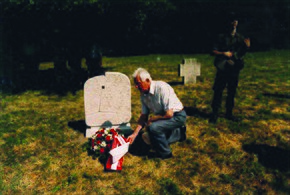Ladislav Ťažký
Ladislav Ťažký (born September 19, 1924 in Čierny Balog , Czechoslovakia ; † January 20, 2011 in Bratislava ) was a Slovak writer and publicist .
Life
Ťažký was born in a Slovak family of forest workers. He was trained in Čierny Balog and in 1940 he received training at the Military Cartographic Institute. He worked briefly as an apprentice baker, from 1938–1940 as a lumberjack and as a road construction worker in Brezno . During the Second World War he showed a patriotic and anti-fascist attitude.
Kaisersteinbruch prisoner of war camp
In 1941 he was deployed on the Eastern Front, from where a substantial part of his work comes. Later he took part in the resistance during the Slovak National Uprising , after which he was interned in Romania. He managed to escape from a prison camp, but was captured again in Hungary and taken to the Kaisersteinbruch Stalag XVII A prisoner of war camp in Austria.
After the war he worked briefly as a draftsman in Košice , from 1946–1948 he was a social officer in Brezno. From 1948 to 1952 he studied at the Prague Political and Economic University. From 1952 to 1958 he was an employee of the Central Cultural Department of the Komunistická strana Slovenska in Bratislava, from 1959 to 1962 he had an apprenticeship at the Institute for Social Sciences of the Central Committee of the KPČ in Prague. For a while he devoted himself to his own writing, in 1967/1968 he worked as an editor for the newspaper Smena . He was expelled from the Communist Party of Slovakia and the Slovak Writers' Union for his public condemnation of the invasion of Czechoslovakia by Warsaw Pact troops in 1968 and the subsequent cleansing of public life in 1970.
Honorary Chairman of the Slovak Writers' Union
He later worked at the Institute for Pop Culture. Since 1979 he has only devoted himself to his literary work. At the time of the so-called normalization , he had various workplaces under the supervision of the State Security . After the Slovak Republic became independent in 1993, a candidacy for the office of President of Slovakia was put forward, which he refused. Since 1990 he has been honorary chairman of the Slovak Writers' Union, board member of Matica slovenská and an external advisor to the Slovak President. He last lived in Bratislava and was still active in literature and journalism until his death on January 20, 2011.
plant
He made his debut with a collection of short stories, later writing mostly short stories and novels. The most frequent subjects of his works were the Second World War and the Slovak National Uprising. Ťažký used many authentic and autobiographical elements. In addition to his prose work, he devoted himself to scripts, plays, travelogues and journalistic texts, but above all to literature. According to his scenario, the film triptych Zbehovi, Pútnici, Dominika - deserter, pilgrim, Dominika was created in 1968 by the director Juraj Jakubisko .
- The married couple Klara Köttner-Benigni and Walter Benigni established a connection to the Kaisersteinbruch Museum and Culture Association ; with his compatriot Jan Kudela they were living witnesses of Stalag XVII A # Slovak prisoners of war .
Ladislav Ťažký: " Gospel of the platoon leader Matthew I and II". (Evanjelium čatára Matúša I. a II. , 1979), the chapter Kaisersteinbruch 1944 , translation Slovak-German by Karl Heinz Jähn, typewritten copy published in: Helmuth Furch (Ed.): Mitteilungen des Museums- und Kulturverein Kaisersteinbruch No. 7, March 1991, pp. 9-19; No. 8, May 1991, pp. 8-20; No. 9, June 1991, pp. 10-20.
Web links
- Literature by and about Ladislav Ťažký in the catalog of the German National Library
- Portrait (slovak)
- List of Writings ( Czech National Library )
- Entry about Ladislav Ťažký on Literárne informačné centrum ( German )
| personal data | |
|---|---|
| SURNAME | Ťažký, Ladislav |
| BRIEF DESCRIPTION | Slovak writer and publicist |
| DATE OF BIRTH | September 19, 1924 |
| PLACE OF BIRTH | Čierny Balog |
| DATE OF DEATH | January 20, 2011 |
| Place of death | Bratislava |

